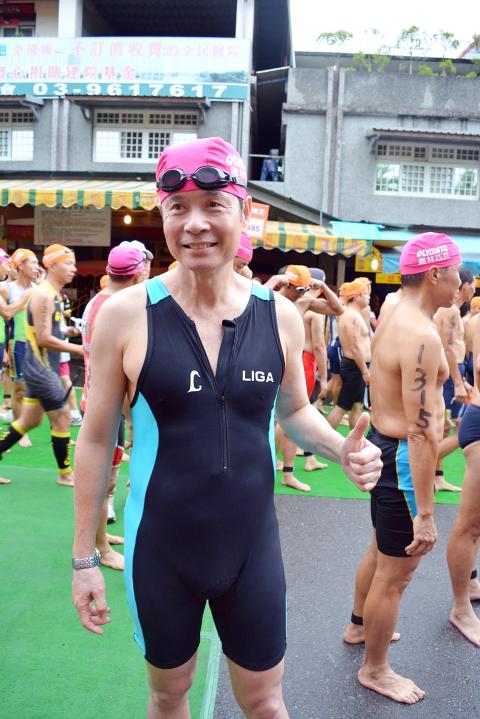A poll by the Taiwan Indicator Survey Research released on Friday found that President Ma Ying-jeou (馬英九) administration is not only losing popularity with the public, but its policies and conduct in judicial matters are coming under doubt.
A majority of the poll respondents felt that the Ma government had gone back on its 2008 promise to halt illegal wiretapping and other illegal actions.
The research group conducted the poll on Tuesday and Wednesday and asked two questions, but varied the answer style between random answers, itemized listing and multiple-choice.

Photo: Chu Tze-wei, Taipei Times
The questions were: “Has the government been choosing which judiciary cases to investigate” and “Has the government intervened illegally in judiciary affairs.”
The poll found that 72.4 percent of respondents said the government has abused its power, 67 percent said the government was selective in deciding which cases to investigate, 66.8 percent said the government was interfering with prosecutors’ investigations and 66.2 percent said the government was interfering with judicial cases.
The poll also found that 66.1 percent of respondents felt that political factors were preventing media from reporting on cases, 62.5 percent feel the government is conducting illegal wiretaps and 53.8 percent believe there is political interference with election organizations, while 13.6 percent declined to comment.
When asked whether they thought political interference with the judiciary had reached a severe stage, 59 .6 percent of respondents said there was severe political intervention with the judiciary and prosecutors’ investigations, 14.4 percent felt there was not severe intervention and 26 percent did not respond.
Cross-analysis of the data showed that even 49.7 percent of Chinese Nationalist Party (KMT) supporters felt their selective prosecutions had reached a severe level.
The poll also found that 72.4 percent of respondents were dissatisfied with the president’s performance, while 15.6 percent were satisfied.
The results show 19.9 percent of respondents trust the government, while 62.5 percent do not.
The poll also found that 51 percent of respondents do not trust National Security Council Secretary-General King Pu-tsung (金溥聰) and 15.1 percent said they did trust him, while 34 percent decline to comment.
The survey polled individuals aged 20 years or over and collected 1,009 valid samples. The margin of error is 3.1 percentage points.

CHANGING LANDSCAPE: Many of the part-time programs for educators were no longer needed, as many teachers obtain a graduate degree before joining the workforce, experts said Taiwanese universities this year canceled 86 programs, Ministry of Education data showed, with educators attributing the closures to the nation’s low birthrate as well as shifting trends. Fifty-three of the shuttered programs were part-time postgraduate degree programs, about 62 percent of the total, the most in the past five years, the data showed. National Taiwan Normal University (NTNU) discontinued the most part-time master’s programs, at 16: chemistry, life science, earth science, physics, fine arts, music, special education, health promotion and health education, educational psychology and counseling, education, design, Chinese as a second language, library and information sciences, mechatronics engineering, history, physical education

DEADLOCK: As the commission is unable to forum a quorum to review license renewal applications, the channel operators are not at fault and can air past their license date The National Communications Commission (NCC) yesterday said that the Public Television Service (PTS) and 36 other television and radio broadcasters could continue airing, despite the commission’s inability to meet a quorum to review their license renewal applications. The licenses of PTS and the other channels are set to expire between this month and June. The National Communications Commission Organization Act (國家通訊傳播委員會組織法) stipulates that the commission must meet the mandated quorum of four to hold a valid meeting. The seven-member commission currently has only three commissioners. “We have informed the channel operators of the progress we have made in reviewing their license renewal applications, and

The High Prosecutors’ Office yesterday withdrew an appeal against the acquittal of a former bank manager 22 years after his death, marking Taiwan’s first instance of prosecutors rendering posthumous justice to a wrongfully convicted defendant. Chu Ching-en (諸慶恩) — formerly a manager at the Taipei branch of BNP Paribas — was in 1999 accused by Weng Mao-chung (翁茂鍾), then-president of Chia Her Industrial Co, of forging a request for a fixed deposit of US$10 million by I-Hwa Industrial Co, a subsidiary of Chia Her, which was used as collateral. Chu was ruled not guilty in the first trial, but was found guilty

Taiwan People’s Party (TPP) Chairman Huang Kuo-chang (黃國昌) yesterday appealed to the authorities to release former Taipei mayor Ko Wen-je (柯文哲) from pretrial detention amid conflicting reports about his health. The TPP at a news conference on Thursday said that Ko should be released to a hospital for treatment, adding that he has blood in his urine and had spells of pain and nausea followed by vomiting over the past three months. Hsieh Yen-yau (謝炎堯), a retired professor of internal medicine and Ko’s former teacher, said that Ko’s symptoms aligned with gallstones, kidney inflammation and potentially dangerous heart conditions. Ko, charged with